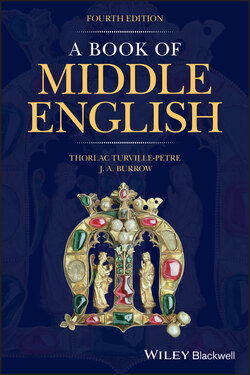Читать книгу A Book of Middle English - J. A. Burrow - Страница 44
4.4.3 Comparison of Adjectives
ОглавлениеComparatives and superlatives are formed, as today, by the addition of ‐er, previously ‐(e)re, and ‐est to the positive form: wis, wiser, wisest; laþ, ‘hateful’, laþre, laþest. Where the vowel is long, it is often shortened in the comparative and superlative, with the final consonant doubled, as greet, ‘great’, 18a/133; grettest, 18a/200. Cortays, ‘courteous’, has superlative curtest (11/249). Adjectives ending in ‐ly or ‐lich have, beside ‐lier and ‐liest, alternative endings ‐loker and ‐lokest: semloker, ‘more seemly’, 9/83; semlokest, 14g/6.
A few adjectives change their stem vowel: long, lenger; old or ald, eldest; strong, strengest.
Irregular forms are mostly familiar from Modern English; for example, in text 9: god, better, best; littel, lasse, lest; muche, more, most; in text 1: yvel, werse.
